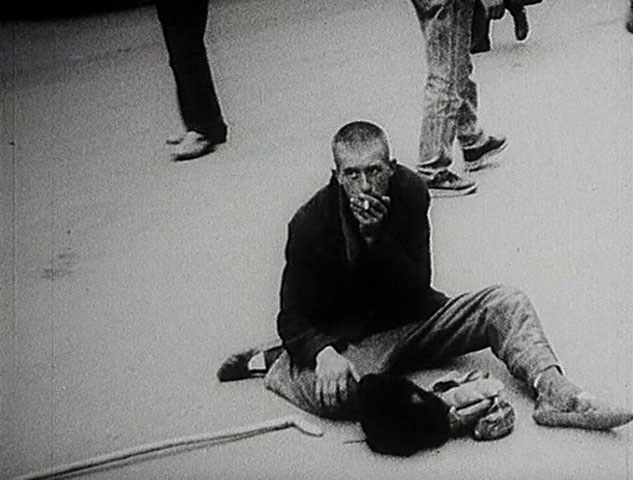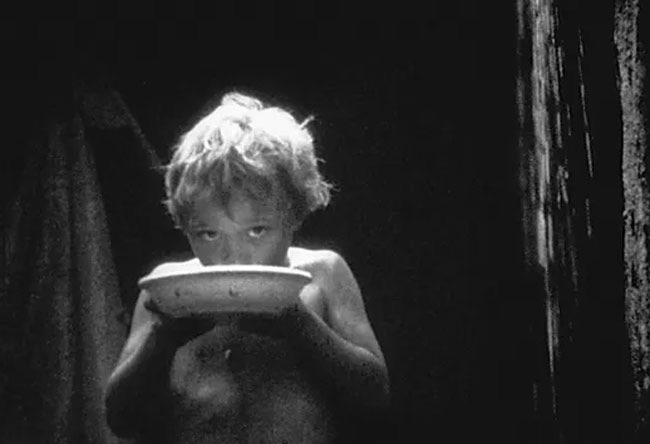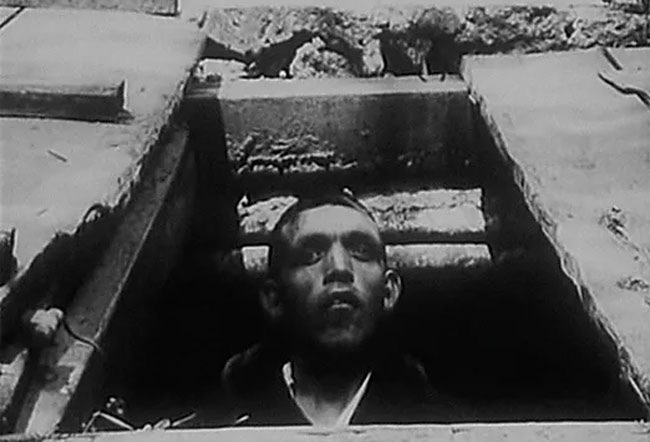Les Paumes de la mendicité
-
Réalisé par Artur Aristakisian • Écrit par Artur Aristakisian
-
Russie • 1994 • 138 minutes • 35 mm • Noir & Blanc
- Réalisation :
Artur Aristakisian - Écriture :
Artur Aristakisian - Image :
Artur Aristakisian - Son :
Artur Aristakisian - Montage :
Artur Aristakisian
- Production (structure) :
The VGIK (The All-Russia State Institute of Cinematography) - Ayant droit :
The VGIK (The All-Russia State Institute of Cinematography)
- N° ISAN :
non renseigné
Résumé
Immersion dans le monde des mendiants, des exclus et des marginaux. Hommes, femmes et enfants au corps déformé marchent dans les rues en quête d’un peu de nourriture. Aristakisian les saisit et les suit dans les rues de Chișinău, en Moldavie. Il les filme frontalement, marchant devant eux ou les rattrapant comme s'il était mû par une impulsion, par la nécessité d’entonner, sous la forme d’une lettre à un fils à naître, un chant mystique et visionnaire invitant l'auditeur à s'opposer au "système" et à rejoindre le "corps" résistant des pauvres.
"Chișinău, Moldavie. Des marginaux, des handicapés, des sous-prolétaires sont les héros de cette fresque en noir et blanc. Le film les laisse muets, c’est leur corps et leurs gestes qui parlent pour eux. Ainsi que la voix du réalisateur qui les accompagne, les berce et les console à distance. Mais cette distance n’est pas celle de l’observation, plutôt l’écart amoureux d’un regard halluciné, appuyé d’un commentaire en forme de lettre adressée à son fils à naître, pour mieux chanter leur misère comme l’endroit de leur sainteté. Artur Aristakisian, homme de peu de films, tous d’ampleur confondante, offre ici un cinéma visionnaire."
(Jean-Pierre Rehm - FIDMarseille)
An immersion into the world of beggars, the excluded and the marginalised. Men, women and children with distorted bodies walk the streets in search of a little sustenance. They are captured and followed in the streets of Chișinău, Moldavia by Aristakisian who films them frontally, walking ahead of them or catching up to them as if driven by an impulse, the necessity to deliver, in a letter addressing a son yet unborn, a mystical and visionary chant, calling on the listener to oppose the “system” and to join the resisting “body” of the poor.
"Chișinău, Moldavia. Dropouts, handicapped persons, members of the urban underclass are the heroes of this fresco in black and white. The film leaves them mute; it is their bodies and their gestures that speak for them. As well as the voice of the filmmaker who accompanies them, soothers them and consoles them from a distance. But this distance is not that of observation; it is rather the loving gap of a hallucinatory gaze, backed up by a commentary in form of a letter addressed his son to be born, in order to better sing their misery as the place of their saintliness. Artur Aristakisian, man of few films, all formats included, offers here a visionary cinema."
(Jean-Pierre Rehm - FIDMarseille)
Mot(s)-clé(s) thématique(s)
Sélections et distinctions
- 2010 • FIDMarseille - Festival International de Cinéma de Marseille • Marseille (France) • Sélection
- 2010 • États généraux du film documentaire • Lussas (France) • Route du doc : Russie
Comment avoir accès au film ?
-
Édition DVD
- Il n'existe pas d'édition DVD à notre connaissance
-
Accès VOD
- Il n'existe pas d'accès en VOD à notre connaissance
- Distribution
- Aide sur les moyens d'accéder à un film


